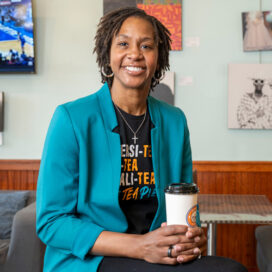Catholic colleges & universities: Program aids post-volunteer transition
Published: November 14, 2008 / Author: Teresa Malcom
In a typical year at the University of Notre Dame, 10 percent of the graduating class leaves to pursue a year or two of volunteer service, and during commencement week, these graduates’ plans are honored with a sending-off ceremony. Now the Indiana university has launched a program to lend support at the other end of the volunteer experience — not only for the school’s own graduates, but for any person leaving a program such as the Jesuit Volunteer Corps or the Peace Corps and entering a more traditional career track.
The first “Leaders in Transition” certificate program was held Aug. 3-8, sponsored by Notre Dame’s Master of Nonprofit Administration program, Center for Social Concerns, Alumni Association and Career Center.
Tom Harvey, director of the Master of Nonprofit Administration, said Leaders in Transition was a response to anecdotal evidence of the challenges faced by those leaving volunteer experiences. “We hear that it sometimes takes them 70 to 90 days to get a job, because they work until the last day in Uganda, or Kenya, or Ecuador, and they probably feel a little guilty for leaving,” he explained. The Leaders in Transition program was designed both to aid returning volunteers in reflecting on their experiences and to provide the nuts-and-bolts of going into the job market: putting together a resumé, preparing for interviews, analyzing where the jobs are going to be.
“We wanted to reward them for their commitment and to give them every tool to go to full-time employment as quickly as possible,” Harvey said.
Twenty-seven people attended the pilot program, coming from a range of volunteer experiences, both domestic and international. A number served with Catholic organizations such as the Jesuit Volunteer Corps, Maryknoll, Lasallian Volunteers, Holy Cross Associates and Good Shepherd Volunteers; there were also those returning from the Peace Corps and AmeriCorps.
Funding from the Arthur Foundation underwrote much of participants’ expenses. Aside from a $25 application fee, the Leaders in Transition program was free. “We worked on the assumption that they have very little coming back from these experiences, so we gave each one a $250 stipend that they could use toward their travel,” Harvey said. Participants stayed in a retreat house on Notre Dame’s campus for just $20 a night.
For Jenny Mohan, 24, her post-volunteer challenges included “coming out of a controlled environment, back into a world where people make disposable incomes and can easily spend their money,” she told NCR. After serving with the Lasallian Volunteers at San Miguel Academy in Newburgh, N.Y., and with the mentally ill and homeless as a Gateway Vincentian Volunteer, “adjusting back to the reality of how people who have money actually spend it was an eye-opening experience.”
Mohan, whose volunteer service ended in June, learned about the Leaders in Transition program from a staff member with the Lasallian Volunteers. In an e-mail to NCR, Mohan — now a graduate student at DePaul University, studying nonprofit management administration — praised the program, saying it “helps you as an individual learn to identify how those [volunteer] experiences have changed your life and how they will direct your life in the sense of a career path and how you now make decisions.”
A second Leaders in Transition program is being planned for next year, with participants’ feedback considered for any changes to the schedule and curriculum. Based on those evaluations, practical tools for career planning and the job search proved popular, according to Kim Brennan, program manager for Notre Dame’s Master of Nonprofit Administration. Such sessions included one on discerning transferable skills from volunteer to salaried positions, and one on financial planning and building wealth even while working in the nonprofit sector.
Brennan said that attendees also seemed inspired by meeting other former volunteers who had accomplished the transition to post-service careers. Notre Dame alumni spoke on a panel for the Leaders in Transition program on “what types of transformations occurred when they were on their year of service and how that affected their life in terms of personal and professional goal-setting,” Brennan told NCR.
###
/news_and_events/news_articles/article/1128/catholic-colleges-amp-universities-program-aids-post-volunteer-transition




